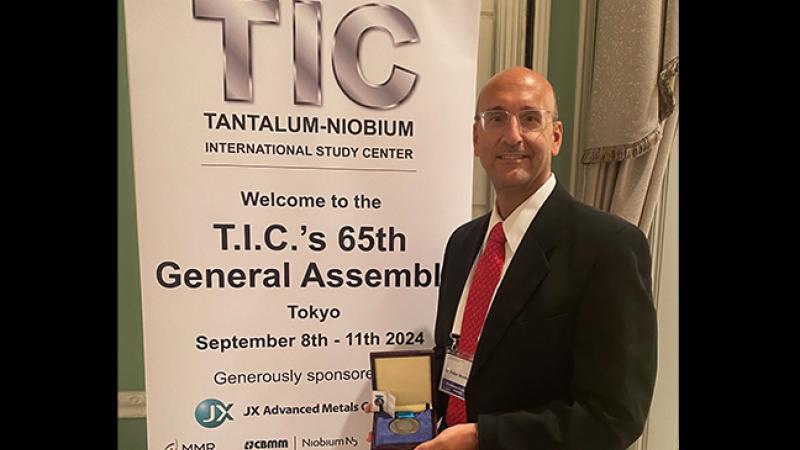Peter J. Bonitatibus Jr. wins the Anders Gustaf Ekeberg Tantalum Prize
October 8, 2024

Rensselaer Polytechnic Institute’s Peter J. Bonitatibus Jr., Ph.D., associate professor of chemistry and chemical biology, has been honored with the Anders Gustaf Ekeberg Tantalum Prize for excellence in tantalum research and innovation. Bonitatibus was presented the award by the Tantalum-Niobium International Study Center (T.I.C.) based out of Belgium at T.I.C.'s 65th General Assembly held in Tokyo, Japan.
The Anders Gustaf Ekeberg Tantalum Prize is part of a long tradition of awards for excellence in metals, chemistry, and related disciplines, including the Albert Einstein World Award of Science, the Nobel Prizes, the Bessemer Gold Medal, The Charles Hatchett Award Prize, The Gadolin Medal of the Society of Finnish Chemists, and The Davy Medal of the (UK) Royal Society.
“Up to now, recognition for contributions to my field have been largely domestic through deeply appreciated collaborations, grant awards, publications, and patents,” said Bonitatibus. “It is just incredible to be acknowledged on an international stage, particularly at this point in my career at RPI.”
Bonitatibus received the award in recognition of his work toward the clinical translation of a tantalum oxide nanoparticle-based contrast agent for improved diagnostic CT imaging capabilities. This body of work involved extensive process chemistry development and preclinical good laboratory practice (GLP) and non-GLP safety and efficacy testing. Together with Benjamin Yeh, M.D., at the University of California San Francisco, they are targeting human trials for 2025.
With the award, Bonitatibus feels a deepened connection to his advisor at the Massachusetts Institute of Technology. “Professor R.R. Schrock discovered the first example of a stable transition metal (tantalum) alkylidene species, Ta=CHR,” said Bonitatibus. “Schrock’s tantalum compound set the stage for related high oxidation state molybdenum and tungsten alkylidene chemistry which was developed by his group over 30 years and ultimately led to a Nobel Prize in 2005.”
Bonitatibus was also elated that his 15-year-old daughter was able to join him in Japan for the award ceremony.